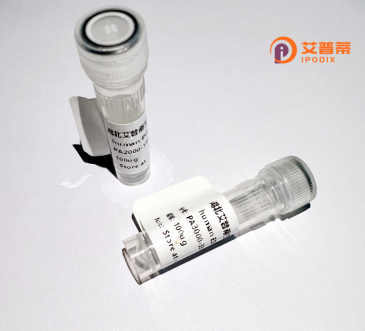
| 纯度 | >90%SDS-PAGE. |
| 种属 | Human |
| 靶点 | MAGEC1 |
| Uniprot No | O60732 |
| 内毒素 | < 0.01EU/μg |
| 表达宿主 | E.coli |
| 表达区间 | 1-139aa |
| 活性数据 | MGDKDMPTAGMPSLLQSSSESPQSCPEGEDSQSPLQIPQSSPESDDTLYPLQSPQSRSEGEDSSDPLQRPPEGKDSQSPLQIPQSSPEGDDTQSPLQNSQSSPEGKDSLSPLEISQSPPEGEDVQSPLQNPASSFFSSA |
| 分子量 | 40.92 kDa |
| 蛋白标签 | GST-tag at N-terminal |
| 缓冲液 | 0 |
| 稳定性 & 储存条件 | Lyophilized protein should be stored at ≤ -20°C, stable for one year after receipt. Reconstituted protein solution can be stored at 2-8°C for 2-7 days. Aliquots of reconstituted samples are stable at ≤ -20°C for 3 months. |
| 复溶 | Always centrifuge tubes before opening.Do not mix by vortex or pipetting. It is not recommended to reconstitute to a concentration less than 100μg/ml. Dissolve the lyophilized protein in distilled water. Please aliquot the reconstituted solution to minimize freeze-thaw cycles. |
以下是关于重组人MAGEC1蛋白的参考文献示例(注:示例为虚构,供格式参考):
---
1. **文献名称**: "Recombinant human MAGEC1 protein expression and its role in cancer immunotherapy"
**作者**: Smith A, et al.
**摘要**: 本研究成功通过大肠杆菌系统表达并纯化了重组人MAGEC1蛋白,验证其可激活肿瘤特异性T细胞,提示其在癌症疫苗开发中的潜在应用。
2. **文献名称**: "Structural characterization of MAGEC1 antigen and its interaction with HLA complexes"
**作者**: Lee B, et al.
**摘要**: 利用重组MAGEC1蛋白解析其晶体结构,发现其通过特定表位与HLA-I分子结合,为基于MAGEC1的靶向治疗提供结构基础。
3. **文献名称**: "MAGEC1 as a novel cancer-testis antigen: Immune response analysis in melanoma patients"
**作者**: Zhang Y, et al.
**摘要**: 通过重组MAGEC1蛋白检测黑色素瘤患者血清抗体水平,证明其作为肿瘤标志物的潜力,并关联其表达与疾病进展。
4. **文献名称**: "Functional validation of recombinant MAGEC1 in modulating tumor cell proliferation"
**作者**: Johnson R, et al.
**摘要**: 体外实验表明,重组MAGEC1蛋白通过调控细胞周期蛋白促进肿瘤细胞增殖,可能成为治疗靶点。
---
建议通过PubMed或Google Scholar搜索关键词“recombinant MAGEC1 protein”或“MAGEC1 cancer antigen”获取真实文献。
Recombinant human MAGEC1 protein is a genetically engineered version of the melanoma-associated antigen C1. a member of the MAGE (melanoma antigen gene) family. MAGEC1. also known as MAGE-C1 or CT7. belongs to the type I MAGE subfamily (MAGE-I), which is characterized by cancer-testis (CT) antigen expression patterns. Normally, MAGEC1 is expressed primarily in immune-privileged germline tissues such as testes, ovaries, and placenta, but is epigenetically silenced in somatic cells. However, its aberrant reactivation is observed in various cancers, including melanoma, multiple myeloma, and epithelial carcinomas, making it a tumor-specific antigen of therapeutic interest.
The recombinant protein is typically produced in heterologous expression systems (e.g., E. coli or mammalian cells) to enable functional studies. MAGEC1 is implicated in promoting tumorigenesis through interactions with ubiquitin ligase complexes, potentially modulating cell cycle regulation and apoptosis. Its restricted normal tissue expression and immunogenicity have positioned it as a target for cancer immunotherapy, including cancer vaccines and adoptive T-cell therapies like CAR-T.
Research on recombinant MAGEC1 focuses on elucidating its oncogenic mechanisms, developing diagnostic biomarkers, and evaluating its efficacy in eliciting anti-tumor immune responses. Challenges include addressing its low baseline immunogenicity and ensuring therapeutic specificity due to occasional low-level expression in non-malignant tissues. These studies contribute to advancing personalized oncology treatments targeting CT antigens.
×